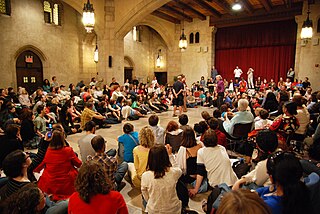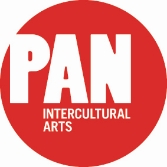
Improvisational theatre, often called improvisation or improv, is the form of theatre, often comedy, in which most or all of what is performed is unplanned or unscripted, created spontaneously by the performers. In its purest form, the dialogue, action, story, and characters are created collaboratively by the players as the improvisation unfolds in present time, without use of an already prepared, written script.

Augusto Boal was a Brazilian theatre practitioner, drama theorist, and political activist. He was the founder of Theatre of the Oppressed, a theatrical form originally used in radical left popular education movements. Boal served one term as a Vereador in Rio de Janeiro from 1993 to 1997, where he developed legislative theatre.
Community theatre refers to any theatrical performance made in relation to particular communities—its usage includes theatre made by, with, and for a community. It may refer to a production that is made entirely by a community with no outside help, or a collaboration between community members and professional theatre artists, or a performance made entirely by professionals that is addressed to a particular community. Community theatres range in size from small groups led by single individuals that perform in borrowed spaces to large permanent companies with well-equipped facilities of their own. Many community theatres are successful, non-profit businesses with a large active membership and, often, a full-time staff. Community theatre is often devised and may draw on popular theatrical forms, such as carnival, circus, and parades, as well as performance modes from commercial theatre. This type of theatre is ever-changing and evolving due to the influences of the community; the artistic process can often be heavily affected by the community's socioeconomic circumstances.
Invisible theatre is a form of theatrical performance that is enacted in a place where people would not normally expect to see one, for example in the street or in a shopping centre. Performers disguise the fact that it is a performance from those who observe and who may choose to participate in it, thus leading spectators to view it as a real, unstaged event.

Experimental theatre, inspired largely by Wagner's concept of Gesamtkunstwerk, began in Western theatre in the late 19th century with Alfred Jarry and his Ubu plays as a rejection of both the age in particular and, in general, the dominant ways of writing and producing plays. The term has shifted over time as the mainstream theatre world has adopted many forms that were once considered radical.
Applied drama is an umbrella term for the use of theatrical practices and creativity that takes participants and audience members further than mainstream theatre. It is often in response to conventional people with real life stories. The work often happens in non-conventional theatre spaces and social settings. There are several forms and practices considered to be under the umbrella of applied theatre.

The Theatre of the Oppressed (TO) describes theatrical forms that the Brazilian theatre practitioner Augusto Boal first elaborated in the 1970s, initially in Brazil and later in Europe. Boal was influenced by the work of the educator and theorist Paulo Freire and his book Pedagogy of the Oppressed. Boal's techniques use theatre as means of promoting social and political change in alignment originally with radical-left politics and later with centre-left ideology. In the Theatre of the Oppressed, the audience becomes active, such that as "spect-actors" they explore, show, analyse and transform the reality in which they are living.
Cardboard Citizens is the UK's only homeless people's professional theatre company, and the leading practitioner of Forum Theatre and the Theatre of the Oppressed methodology in the UK. The acclaimed theatre company works with people who have experience of homelessness or those at risk of becoming homeless to create theatre that makes a real and positive difference to society and those living in its margins.
Adrian Antony Jackson is an English theatre director, playwright, teacher and trainer.
The Lehrstücke are a radical and experimental form of modernist theatre developed by Bertolt Brecht and his collaborators from the 1920s to the late 1930s. The Lehrstücke stem from Brecht's epic theatre techniques but as a core principle explore the possibilities of learning through acting, playing roles, adopting postures and attitudes etc. and hence no longer divide between actors and audience. Brecht himself translated the term as learning-play, emphasizing the aspect of learning through participation, whereas the German term could be understood as teaching-play. Reiner Steinweg goes so far as to suggest adopting a term coined by the Brazilian avant garde theatre director Zé Celso, Theatre of Discovery, as being even clearer.
Participatory art is an approach to making art which engages public participation in the creative process, letting them become co-authors, editors, and observers of the work. This type of art is incomplete without viewers' physical interaction. It intends to challenge the dominant form of making art in the West, in which a small class of professional artists make the art while the public takes on the role of passive observer or consumer, i.e., buying the work of the professionals in the marketplace. Commended works by advocates who popularized participatory art include Augusto Boal in his Theater of the Oppressed, as well as Allan Kaprow in happenings.
Interactive theatre is a presentational or theatrical form or work that breaks the "fourth wall" that traditionally separates the performer from the audience both physically and verbally.
Forum theatre is a type of theatre created by Brazilian theatre director Augusto Boal. It is one of the techniques under the umbrella term of Theatre of the Oppressed (TO). This relates to the engagement of spectators influencing and engaging with the performance as both spectators and actors, termed "spect-actors", with the power to stop and change the performance. As part of TO, the issues dealt with in forum theatre are often related to areas of social justice, with the aim of exploring solutions to oppression featured in the performance.
Theatre pedagogy is an independent discipline combining both theatre and pedagogy. As a field that arose during the 20th century, theatre pedagogy has developed separately from drama education, the distinction being that the drama teacher typically teaches method, theory and/or practice of performance alone, while theatre pedagogy integrates both art and education to develop language and strengthen social awareness. Theatre pedagogy is rooted in drama and stagecraft, yet works to educate people outside the realm of theatre itself.
David Diamond is a founding member of the Vancouver based theatre company Theatre for Living. He is the originator of Theatre for Living techniques. He was Artistic Director of the theatre company from 1984 until 2018 when, with the support of the board of directors and Staff he decided to 'devolve' the organization. Diamond continues to offer Theatre for Living workshop processes on many issues with communities who invite him to do so and also offers training workshops in Theatre for Living techniques. He is also a keynote speaker, author and actor.
Theatre Versus Oppression (TVO) is a UK registered charity which specialises in using Applied Theatre techniques to bring about positive change and development in communities and individuals. TVO works with people who have experienced oppression using applied theatre techniques and counselling methods to allow them to explore and speak out about their experiences.

Pan is an intercultural arts organization and registered charity based in London, UK, that uses the arts to explore cultural diversity and social change. The main purpose of the organization is to help marginalised young people from all cultures and religions who are at risk of social exclusion to improve personal and interpersonal skills through a range of arts activities including drama, music, film, dance, creative writing and visual arts.
Chen Alon is an Israeli lecturer, activist, and cofounder of Combatants for Peace. Alon is the Theater Director of the movement. He was nominated, along with Palestinian Combatants for Peace co-founder, Sulaiman Khatib, for the Nobel Peace Prize in 2017. Alon served for four years as an officer in the Israeli Defense Force, upon his release he served 11 years as an operations officer in the reserves. Later he became a "refusenik," and co-founded the group "Courage to Refuse," a group of former IDF officers and combat soldiers refusing to serve in the occupied territories. As a result, he served time in jail. Alon currently works as Theater Director and lecturer at Tel Aviv University.
Immersive theater differentiates itself from traditional theater by removing the stage and immersing audiences within the performance itself. Often, this is accomplished by using a specific location (site-specific), allowing audiences to converse with the actors and interact with their surroundings (interactive), thereby breaking the fourth wall.
Sensory Labyrinth Theatre (SLT) is an applied immersive, site-specific one-to-one multi-sensory theatre methodology. It was developed by Iwan Brioc, the director of Theatr Cynefin. SLT is inspired by Enrique Vargas' Sensory Poetics and Augusto Boal's 'Theatre of the Oppressed'. The theatre methodology transforms the stage into the mind of the audience member, with actors taking on the role of gatekeepers and scenes becoming sensory portals. SLT combines theatre and mindfulness practices to facilitate personal and social transformation.





